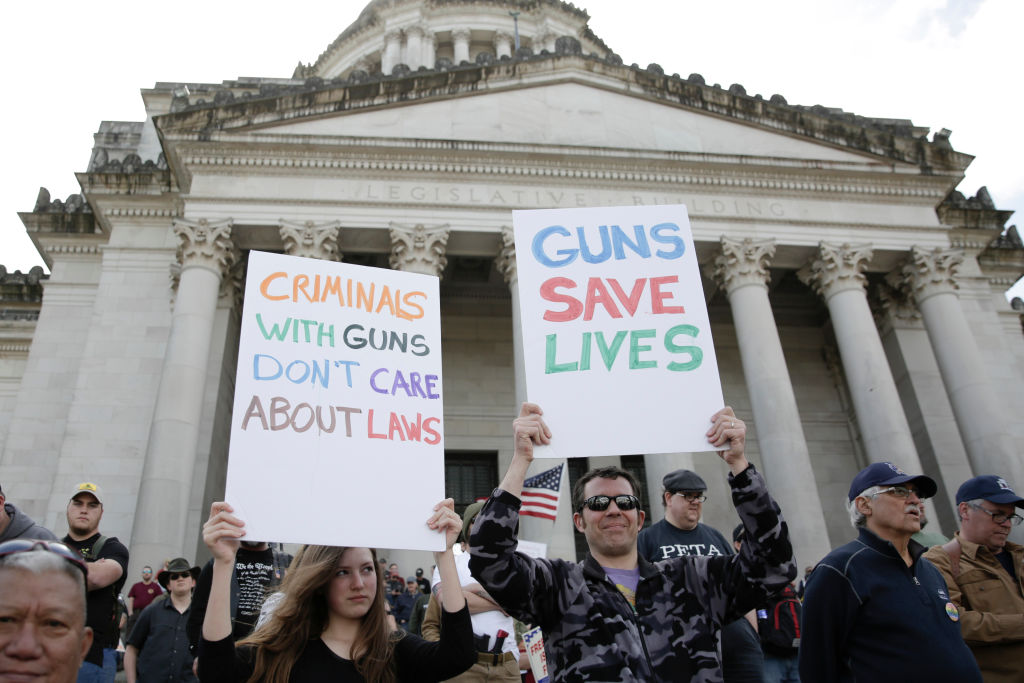Guilty of a non-violent misdemeanor that’s liable for a substantial prison sentence?
No Second Amendment for you, bad guy. Give us your guns, the U.S. government has said.
Not anymore, according to an 11-4 decision by the Third U.S. Circuit Court of Appeals in Philadelphia.
That’s because a Pennsylvania man stood up for his Second Amendment rights.
It all started with a 1995 decision by Bryan Range of Lancaster County to sign his wife’s application for food stamps.
Struggling to raise three children on Range’s $300 weekly pay, the food stamp application, which Range said he did not recall signing, listed the family’s income as lower than what it was.
Snagged for the fraudulent application, Range accepted responsibility, pleaded guilty to making a false statement and got three years probation plus penalties of almost $2,800 in restitution, court costs, and a fine.
At the time of his guilty plea, Range’s offense was a misdemeanor but under Pennsylvania legislation could have brought him a prison term of up to five years.
The potential prison term was the kicker, since federal law said a person guilty of any crime with a prison sentence of more than a year could not possess firearms.
Range, of course, did not serve any prison time but the offense had the potential of a sentence of more than a year.
Three years later, Range tried to buy a gun but Pennsylvania’s instant background checks thwarted him. But his wife, thinking the rejection was a mistake, gave him a deer rifle as a gift.
Later attempting to buy a gun, Range found his background check rejection was for real and was due to his 1995 fraud case. So he sold the deer rifle to a firearms dealer.
And he sued the federal government for violation of his Second Amendment rights.
The United States District Court for the Eastern District of Pennsylvania ruled in 2021 that by law Range was “an unvirtuous citizen,” and guilty of a “serious” crime and should not have guns.
They based their decision on the fact that although Pennsylvania did not, some 40 other jurisdictions would have classified Range’s offense as a felony.
Did you get that?
Courts bend over backward to make sure the criminal history of a true crook stays out of a jury trial, but if some poor guy runs afoul of the welfare bureaucracy in a way that somebody someplace else would consider a felony, he has to pay the penalty of a felon.
Not so fast, wrote Circuit Judge Thomas Hardiman for the majority finding for Range.
Hardiman noted that the 2008 U.S Supreme Court case District of Columbia v. Heller protects the right to bear arms despite no connection to a militia.
And, said Hardiman: “We reject the [federal] Government’s contention that only ‘law abiding, responsible citizens’ are counted among ‘the people’ protected by the Second Amendment.
“Heller and its progeny lead us to conclude that Bryan Range remains among ‘the people’ despite his 1995 false statement conviction,” Hardiman wrote.
Citing the Heller case, Hardiman said it has long been established that felons can lose their Second Amendment rights and noted that initially the felonies tended to be violent or, if non-violent, of a serious nature.
Early gun offenses, Hardiman wrote, could result in forfeiture of a weapon but not Second Amendment rights.
And there is the issue of Range as a criminal. “…the phrase ‘law-abiding, responsible citizens’ is as expansive as it is vague,” Hardiman said.
“Who are ‘law-abiding’ citizens in this context?” he wrote.
“Does it exclude those who have committed summary offenses or petty misdemeanors, which typically result in a ticket and a small fine?
“No. We are confident that the Supreme Court’s references to ‘law-abiding, responsible citizens’ do not mean that every American who gets a traffic ticket is no longer among ‘the people’ protected by the Second Amendment.”
“…Range remains one of ‘the people’ protected by the Second Amendment,” Hardiman concluded. “And his eligibility to lawfully purchase a rifle and a shotgun is protected by his right to keep and bear arms.
“Because the Government has not shown that our Republic has a longstanding history and tradition of depriving people like Range of their firearms, [the federal law in question] cannot constitutionally strip him of his Second Amendment rights.”
It’s a Second Amendment win.
Bryan Range scored a victory for We the People. By making sure he was included among them.
This article appeared originally on The Western Journal.
























